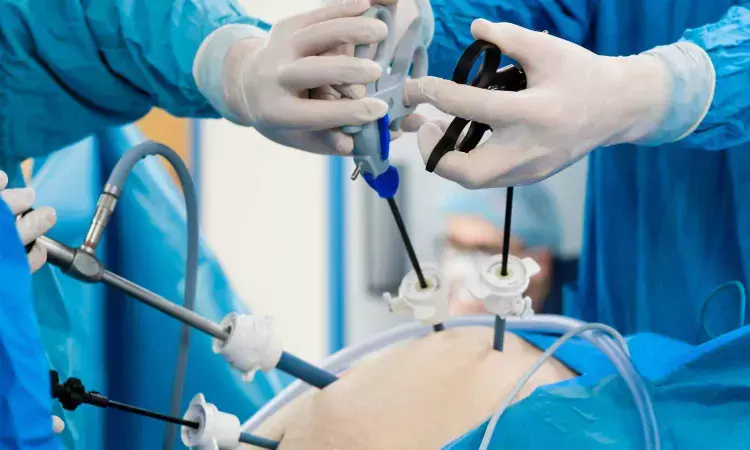- Home
- Medical news & Guidelines
- Anesthesiology
- Cardiology and CTVS
- Critical Care
- Dentistry
- Dermatology
- Diabetes and Endocrinology
- ENT
- Gastroenterology
- Medicine
- Nephrology
- Neurology
- Obstretics-Gynaecology
- Oncology
- Ophthalmology
- Orthopaedics
- Pediatrics-Neonatology
- Psychiatry
- Pulmonology
- Radiology
- Surgery
- Urology
- Laboratory Medicine
- Diet
- Nursing
- Paramedical
- Physiotherapy
- Health news
- Fact Check
- Bone Health Fact Check
- Brain Health Fact Check
- Cancer Related Fact Check
- Child Care Fact Check
- Dental and oral health fact check
- Diabetes and metabolic health fact check
- Diet and Nutrition Fact Check
- Eye and ENT Care Fact Check
- Fitness fact check
- Gut health fact check
- Heart health fact check
- Kidney health fact check
- Medical education fact check
- Men's health fact check
- Respiratory fact check
- Skin and hair care fact check
- Vaccine and Immunization fact check
- Women's health fact check
- AYUSH
- State News
- Andaman and Nicobar Islands
- Andhra Pradesh
- Arunachal Pradesh
- Assam
- Bihar
- Chandigarh
- Chattisgarh
- Dadra and Nagar Haveli
- Daman and Diu
- Delhi
- Goa
- Gujarat
- Haryana
- Himachal Pradesh
- Jammu & Kashmir
- Jharkhand
- Karnataka
- Kerala
- Ladakh
- Lakshadweep
- Madhya Pradesh
- Maharashtra
- Manipur
- Meghalaya
- Mizoram
- Nagaland
- Odisha
- Puducherry
- Punjab
- Rajasthan
- Sikkim
- Tamil Nadu
- Telangana
- Tripura
- Uttar Pradesh
- Uttrakhand
- West Bengal
- Medical Education
- Industry
Robot assisted pancreatoduodenectomy Safe and feasible for Uncinate Process Dissection : Study

Pancreatoduodenectomy, also known as the Whipple procedure, is a complex surgical treatment for malignant and benign tumors of the pancreatic head and periampullary region. One of the most technically challenging aspects of this operation is dissection of the uncinate process, particularly when tumors are large and located adjacent to major vessels such as the superior mesenteric artery (SMA).
With the advent of minimally invasive and robotic approaches, optimizing surgical strategies to enhance safety and oncologic outcomes has become a key focus in hepatopancreatobiliary surgery.
A new study has found that a mesenteric route, SMA-first approach facilitates precise uncinate process dissection and may represent a safe, feasible option for selected patients undergoing robot-assisted pancreatoduodenectomy.
The approach was particularly beneficial in nonobese individuals with large pancreatic head tumors in close proximity to the SMA and portal vein, where conventional dissection can be more technically demanding. In the study, patients undergoing the mesenteric route SMA-first approach demonstrated favorable intraoperative and postoperative outcomes.
The technique allowed for early identification and control of the SMA, reducing intraoperative blood loss and providing a clearer operative field. Importantly, the approach enabled meticulous clearance of the uncinate margin, improving the potential for R0 resection in oncologic cases. Operative times were comparable to standard techniques, and postoperative complication rates, including pancreatic fistula and delayed gastric emptying, remained within expected ranges.
The authors noted that patient selection is critical. The technique may be best suited for nonobese patients, as excessive visceral fat can obscure visualization in the mesenteric window. Additionally, surgeons require advanced robotic expertise and familiarity with vascular dissection to ensure safety. The findings suggest that this modified approach has the potential to expand the role of robotic surgery in complex pancreatic resections, offering a viable alternative for patients with tumors involving the uncinate process.
Reference
Zhang, Y., Patel, N., & Kim, D. H. (2025). Mesenteric route SMA-first approach in robot-assisted pancreatoduodenectomy: Safety and feasibility for uncinate process dissection. Annals of Surgical Oncology, 32(4), 511–520. https://doi.org/10.1245/s10434-025-1234-7
Dr. Shravani Dali has completed her BDS from Pravara institute of medical sciences, loni. Following which she extensively worked in the healthcare sector for 2+ years. She has been actively involved in writing blogs in field of health and wellness. Currently she is pursuing her Masters of public health-health administration from Tata institute of social sciences. She can be contacted at editorial@medicaldialogues.in.
Dr Kamal Kant Kohli-MBBS, DTCD- a chest specialist with more than 30 years of practice and a flair for writing clinical articles, Dr Kamal Kant Kohli joined Medical Dialogues as a Chief Editor of Medical News. Besides writing articles, as an editor, he proofreads and verifies all the medical content published on Medical Dialogues including those coming from journals, studies,medical conferences,guidelines etc. Email: drkohli@medicaldialogues.in. Contact no. 011-43720751


